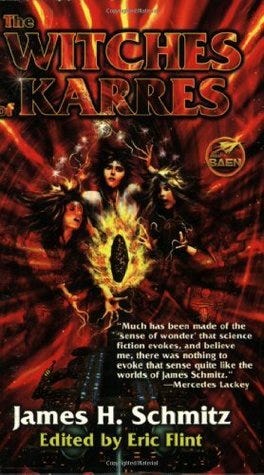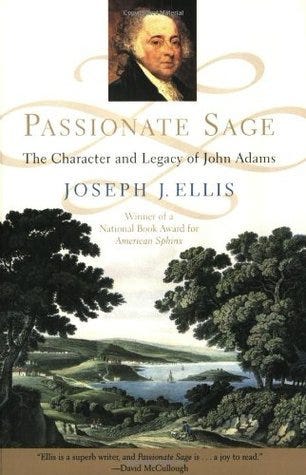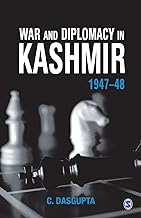Short reviews for December
Witches of Karres, Caught in Crystal, Passionate Sage, War and Diplomacy in Kashmir
The Witches of Karres, by James H. Schmitz (394 pp; 1966)
Who should read this? People who like pulp sci-fi and small-scale space opera.
I read this pulp sci-fi novel back in college, and on reread, I still enjoyed it even though it didn't quite hold up to my memories.
In a space-opera universe, our protagonist - an independent space trader - rescues some young "witches" from slavery and returns them home to the planet Karres. Amid a series of mishaps en route, he learns that they really are effectively witches. (Their "magic" is given a technobabble name and thin veneer, but nothing more.) What's more, he is too. After his rescue yields several layers of legal and social problems, he ends up falling into - on the witches' behalf - a spy game against an alien power that's trying to subvert and conquer the galaxy.
The characters are charming and engaging, more so than many in this pulp era. The overall plot is unfortunately forgettable; the spy game and alien power are supposedly on an epic scale, but it doesn't feel like it, and most of the interestingly-interacting characters have gone elsewhere by that point. But, I love the beginning. The introduction to these young witches' magic, and the captain's growing uneasy awareness of what he's getting himself into - but unwillingness to abandon them - is excellently done. That part, at least, holds up beautifully on reread.
Caught in Crystal, by Patricia C. Wrede (293 pp; 1987)
Who should read this? People who like fantasy books focusing on well-told interpersonal relationships.
Once again, I’d read this book a while before and enjoyed it then; this time, I loved it again now.
Our protagonist, a former adventurer who's retired as a now-widowed mother of two, is found by some of her former adventuring companions to deal with the magical after-effects of one of her quests. She protests that she has to look after her kids. But her companions insist - so she ends up bringing the kids along on this new quest!
Wrede's juxtaposition of realistic-sounding children and fantasy adventure is great. She gradually reveals more of the world as the book goes on, but at every point I know enough to stay located and interested. The magic system and worldbuilding is good. But what really makes the book in my opinion are the protagonist and her kids and how their relationship with each other plays against their relationships with the larger world.
Passionate Sage: The Character and Legacy of John Adams, by Joseph J. Ellis (277 pp; 1993)
Who should read this? People who want to read about Founding Fathers' political philosophy and character.
This's described as a biography of John Adams. It isn't. It tells some anecdotes about his life, focusing on his late Presidency forwards (especially on his late-in-life correspondence with Jefferson), but nothing more. It's more a character study of him, and a study of his political philosophy. Read as that, I find it fascinating.
Adams had a cynical view of human nature, both his own and in general. In general, this led him to distrust popular sentiments and try to design government so the people at large and the "natural aristocracy" could check each other. Unlike some Founding Fathers who viewed America as inevitably set to bring a new age of light and liberty to the world, Adams saw America as nothing more than promising: it could still fall to faction or human shortsightedness. Looking back from my modern vantage, this sounds much more accurate.
On the personal level, Ellis describes Adams as having a drive to place himself where he'd be misunderstood and maligned. The very phrase "natural aristocracy" is an example - Adams meant "talented people," but the phrase he picked was one which every Jeffersonian waved as proof he'd betrayed the Revolution for aristocracy. But sometimes this could be very important for the country, such as when Adams betrayed his party in 1800 to seek peace with France at exactly the moment when they wanted to give it.
I've been interested in the Founding Fathers' lives and characters this last year since reading about Paul Revere, and John Adams is now even more fascinating than he seemed before I read this. But now I want all the more to actually read the biography I thought I was getting and see how this was borne out in the rest of his life.
War and Diplomacy in Kashmir, 1947-48, by C. Dasgupta (239 pp; 2002)
Who should read this? People who're interested in modern international diplomacy, or modern Indian history.
This's a history of the first Indo-Pakistani war, fought over (and in) the disputed princely state of Kashmir, just after both countries had gained independence.
Dasgupta emphasizes the political and diplomatic framework around the war, which is exactly the telling I prefer. I suspect in part that's due to his experience as an Indian diplomat, but also, he believes that's the best way to understand wars in the Third World, fought amidst a framework of superpowers who may want to intervene and often want to keep wars from escalating.
There were two and a half superpowers in the Kashmir war, Dasgupta explains - the British Empire was on the decline, but still a very present force. Especially, British officers still commanded both the Indian and Pakistani armies - officially under the direction of the new governments of both newly-independent Dominions, but all (properly so, Dasgupta admits) primarily loyal to Britain. Dasgupta tells the Kashmir War as primarily the struggle of the Indian government against Britain. Britain first wanted to keep war from breaking out, but then (after Pakistan started the war by going through irregular tribesmen rather than its British-officered army) favored Pakistan due to its larger imperial interests. But still, India was able to fight out a minimally-acceptable compromise before regrouping its army under domestic command.
Dasgupta frames the war in a way such that India comes off much more favorably. If I credit his account, I'd agree - but I'm not sure how much to chalk that up due to his own bias as an Indian diplomat. I'd be interested in a pro-Pakistani telling of the war if I can find one.








You read Caught in Crystal? I didn't think anyone else knew that book! Can't quibble with the review, there were other things I thought she did very well but they're all spoilers.
Have you read The Raven Ring? Same setting, same period of her career, somewhat different context, but I thought it was a lot of fun.
(At the other end of her career, I just finished Dark Lord's Daughter. Clearly setting up what I'm gonna guess is a trilogy - series of some sort, anyway - but I thought it was solid as far as it went.)
Eric Flint and Dave Freer (mostly the latter) wrote some sequels to the Witches of Karres book. They very much keep to the spirit of the original but have slightly more plot